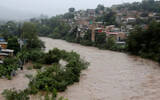Arabica reduced production by more than 10%! Brazil encounters dry weather again
Recently, the well-known consulting firm StoneX released its first estimate for Brazilian coffee production. Brazilian coffee production is expected to reach 65.6 million bags (60 kg / bag) in 2025max 26, a small decrease of 0.4% compared with the previous year.
Of this total, Arabica coffee production is expected to be 40 million bags, a decrease of 10.5% compared with the previous year, while Robusta coffee production is expected to be 25.6 million bags, an increase of 20.9% over the previous year. Although Robusta's production increased, it was not enough to make up for the decrease in Arabica production, so the total production still decreased slightly.
It is understood that the decline in production is due to the fact that the climate in Brazil is not ideal in recent days, especially in the states of Minas Gerais and Sao Paulo in Brazil's main Arabica growing areas. Earlier, Brazil suffered its worst drought in recent years, with little rain in the main coffee-growing areas, and water shortages caused by dry rivers and reservoirs and falling water levels.
Although rain began to resume in Brazil in mid-October, extreme stormy weather occurred in the state of Sao Paulo, with severe flooding threats and record strong winds. Although rainfall can alleviate the problem of soil drought, the wind is too strong, affecting the growth of coffee trees.
In addition, Minas Gerais, Brazil's largest coffee producing region, was severely damaged during the drought, with very little rainfall, and some areas recorded no rainfall for more than 160 days. According to Fundacao Procafe, a coffee research institute in Minas Gerais, before the resumption of rainfall, the soil in Minas' main coffee-producing areas was 250mm less than normal, the second-largest shortage on record.
But from October to early November, Minas also began to rain, but rainfall was very rare. According to meteorologist Climatempo, the average rainfall in October was 63.4mm, much lower than normal. Even in November, there is not enough rainfall, and the weather in the next 10 days is expected to become hotter in the region, with temperatures of up to 35 °C and relatively drier.
This is disadvantageous to the next coffee fruiting period, so many institutions believe that it is almost impossible for coffee trees to return to maximum production. As a result, many institutions believe that Brazilian Arabica coffee production will drop by more than 10%. And in recent days, Arabica coffee futures prices have also been rising due to the news of reduced coffee production in Brazil.
On the contrary, the weather in Esp í rito Santo, Brazil's largest coffee producing region, has improved, with more than 100 mm of rainfall, which has contributed to the drought in the region and is conducive to the growth of Robusta's coffee. Therefore, there is an increasing trend in terms of production.
Recently, however, there is very good news for the Brazilian coffee industry, that is, the European Parliament approved the decision to postpone the implementation of the No deforestation Law (EUDR) for one year, which will come into effect on December 30th, 2025. The European Union accounts for about 20% of Brazilian coffee exports, so delays in the bill give Brazil more time to meet its requirements.
In addition, parliament adopted the concept of a "risk-free country", creating a new category for countries that are developing stable or growing forest areas, which will face looser regulatory requirements but increase the uncertainty of EUDR regulation.
For more information about coffee producing areas, please scan the code directly and follow: coffee comments.
Long press the QR code to follow:
TRANSLATE with
XEnglishArabicHebrewPolishBulgarianHindiPortugueseCatalanHmong DawRomanianChinese SimplifiedHungarianRussianChinese TraditionalIndonesianSlovakCzechItalianSlovenianDanishJapaneseSpanishDutchKlingonSwedishEnglishKoreanThaiEstonianLatvianTurkishFinnishLithuanianUkrainianFrenchMalayUrduGermanMalteseVietnameseGreekNorwegianWelshHaitian CreolePersian
TRANSLATE with
COPY THE URL BELOW
BackEMBED THE SNIPPET BELOW IN YOUR SITE Bing Webmaster PortalBack
Important Notice :
前街咖啡 FrontStreet Coffee has moved to new addredd:
FrontStreet Coffee Address: 315,Donghua East Road,GuangZhou
Tel:020 38364473
- Prev

Storm landfall! 33,000 people were affected in Honduras
According to media reports, Tropical Storm Sara recently formed in the Caribbean Sea, becoming the 18th named storm of the 2024 Atlantic hurricane season. The storm has landed in northern Honduras. Affected by this storm, the President of Honduras declared the country to enter a 30-day state of emergency. According to Hongdura
- Next

What varieties other than rose summer coffee does Panama Jade Manor have? What kind of coffee is Diamond Mountain?
Geisha has always been a popular coffee variety. According to the World Coffee Research Center, the Guisha variety was first discovered in the forests of Ethiopia in the 1930s. It was later sent to research institutions in many countries before spreading to Panama in the 1960s. until
Related
- What grade does Jamaica Blue Mountain No. 1 coffee belong to and how to drink it better? What is the highest grade of Blue Mountain coffee for coffee aristocrats?
- What are the flavor characteristics of the world-famous coffee Blue Mountain No. 1 Golden Mantelin? What are the characteristics of deep-roasted bitter coffee?
- Can I make coffee a second time in an Italian hand-brewed mocha pot? Why can't coffee be brewed several times like tea leaves?
- Hand-brewed coffee flows with a knife and a tornado. How to brew it? What is the proportion of grinding water and water temperature divided into?
- What is the difference between Indonesian Sumatra Mantinin coffee and gold Mantinin? How to distinguish between real and fake golden Mantelin coffee?
- What does bypass mean in coffee? Why can hand-brewed coffee and water make it better?
- Unexpected! Ruixing Telunsu lattes use a smoothie machine to foam milk?!
- % Arabia's first store in Henan opens into the village?! Netizen: Thought it was P's
- Does an authentic standard mocha coffee recipe use chocolate sauce or powder? Mocha Latte/Dirty Coffee/Salty Mocha Coffee Recipe Share!
- What is the difference between Vietnam egg coffee and Norway egg coffee? Hand-brewed single product coffee filter paper filter cloth filter flat solution!

